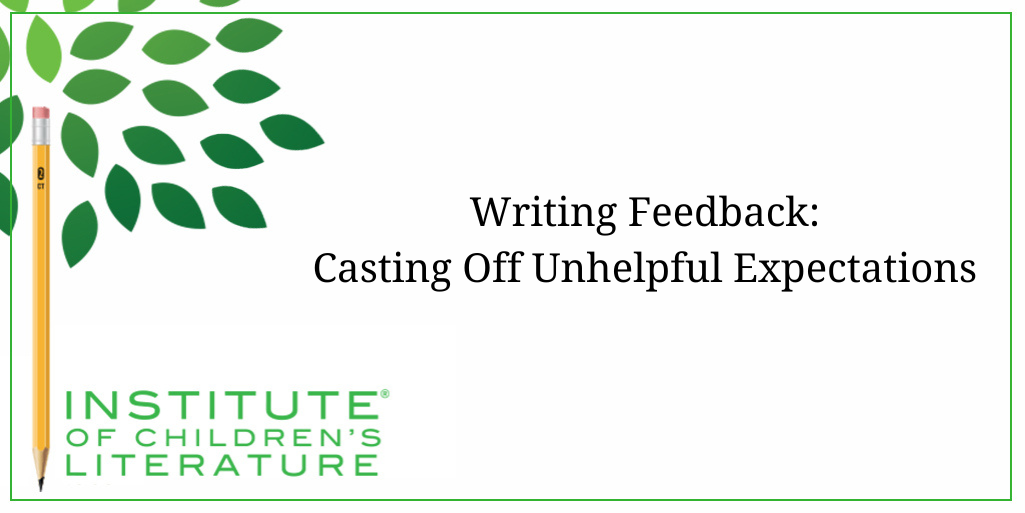
5 Ways Writers Can Prep for 2025 Goal Setting
Before we roll on to the new writing year, let’s harness our optimism for the blank slate before us and prepare for our 2025 Goal Setting just for writers.

Preparing yourself to receive writing feedback can be the best way to ensure you hear what you need to hear to improve your writing. Unfortunately, there are times we can be in a place where we’re not ready to receive useful writing feedback. If you’re seeking professional feedback, like from ICL’s Manuscript Critique Service, you’ve probably paid money for the opportunity, not getting all that you can from the opportunity makes the experience wasteful.

If you ask most anyone why they’re seeking feedback, they’ll tell you the “right” answer, namely that they want to get better. Sometimes that’s true intellectually but not true emotionally. The worthwhile goal of receiving feedback is improvement, but the emotional goal that we must watch out for is seeking validation or praise.
In other words, we say we want to get better, but what we want emotionally is to be told we’re great just as we are. First, there is nothing wrong with enjoying validation and praise. Occasionally when I’m seeking feedback, I also get praise about things I hadn’t given much thought to. That can be helpful too. Knowing what works well helps me to do more of that. But if I’m valuing praise over criticism, or if I’m expecting praise, I can be setting myself up for emotional discomfort that makes me shut down. And sadly, emotional discomfort can make a writer react in ways that devalue the efforts of the person giving the feedback.

Some people go into feedback saying they want to know what’s keeping this piece from selling, but when they learn the answer, they either argue or they simply shut down and say nothing and walk away. I suspect those people were hoping for some tiny tweaks and a huge dollop of reassurance such as “This is great. The publishers have been idiots for rejecting it. Here’s the sensible publishers I know who will love this. Go ahead and use my name when you send it there.” And when I can’t offer that, they get upset. And that’s too bad. I like to think with time and reflection, they reached a place where they received the feedback and moved forward. But too often I learn the person merely self-published with the flaws intact after having embraced the mindset that publishing today doesn’t appreciate new or unique works. Since feedback is expensive (and self-publishing can be disappointing for new, unprepared writers), that always makes me sad.
Sometimes writers go into feedback with very specific guidelines for the person giving the feedback. “I want to know what’s wrong with my beginning and ending. I don’t need help with anything else.” Or maybe, “I don’t need you to mark any grammar or word usage or continuity errors. Just tell me if you would classify this as science fiction.” When you specifically mark things off the critique agenda, you make it harder on the person giving feedback. That can seem illogical. You’re asking for less feedback, not more. Shouldn’t it be easier? But when you’re working with a critique partner or a professional, giving them hard limits means you’re demanding they not use their normal critique approach. They have to come up with a new way to go into the critique, making it more difficult to give feedback. Also, it can mean you are asking the person to ignore serious problems to focus on things that aren’t where your attention needs to go.

Having said that, there is nothing wrong with saying something like: “I want to hear everything, but I feel like I’m having a particular problem with ___________, so can you be sure to look at that especially?” That kind of request will mean the person giving feedback will make a special effort to look at that area and to speak clearly about it, but it won’t keep the person from telling you the things you need most to hear—perhaps things you hadn’t even considered.
Professional feedback, especially as part of a workshop at a writing conference or an in-person writing workshop can come from agents or editors. Some people who seek feedback in these situations don’t want feedback at all. They want to make a connection to this editor or agent. They want the editor or agent to love the piece and make an offer to publish or represent it. No matter how good the feedback they receive will be, they’ll be disappointed if it doesn’t also come with an offer.
I’ve heard of writers who complained about getting feedback at conferences or workshops because “they never signed anyone afterward.” In other words, those writers didn’t assign any value to the feedback. They weren’t paying for feedback. They were paying for a quick connection and publication. And since that wasn’t likely to happen, they were unhappy.

Don’t defend unless you feel the critiquer has gotten the wrong impression. If there is time, you can say, “I meant this to come across as ____, but you clearly saw it as ____. Can you tell me where I went wrong that led to the confusion?” That kind of question will give you clarity. Defending your work will never give you clarity, because it’s using your painfully finite time to avoid accepting input. The input may be flawed, but defending the work won’t help. Something about the work (combined probably with the person’s quick read of the piece) resulted in confusion, so the only useful question is “What caused the confusion?” Don’t try to talk the person out of feedback.
The reality is that the level of feedback you get in most workshops or conferences speed critiques is profoundly limited by the constraints of the situation. You can hear useful things, but you’re likely to get better feedback from a good critique group or critique partner who can give more of their time and mental energy to helping you. Or through a class where the instructor is specifically there to focus on helping this limited group of writers improve.
To get the best feedback possible in whatever situation you encounter, you need to be open. Be open to being surprised. Be open to considering things you hadn’t considered before. Be open to reassessing your strengths and how you’re using them. Be open to learning your weaknesses so you can create a plan to improve.
When it comes to feedback, be a sponge, not a rock. A sponge won’t absorb everything (and when it comes to feedback, it’s worthwhile to analyze and be selective about what you take in) but a rock absorbs very little indeed. Rocks are fairly well known for not changing much. Being closed off from receiving feedback will slow down your ability to grow and change as a writer. And that definitely limits your success.
So, I’m wishing you great sponge opportunities ahead as you go into writing feedback situations ready to absorb and not merely endure.
With over 100 books in publication, Jan Fields writes both chapter books for children and mystery novels for adults. She’s also known for a variety of experiences teaching writing, from one session SCBWI events to lengthier Highlights Foundation workshops to these blog posts for the Institute of Children’s Literature. As a former ICL instructor, Jan enjoys equipping writers for success in whatever way she can.

Before we roll on to the new writing year, let’s harness our optimism for the blank slate before us and prepare for our 2025 Goal Setting just for writers.

Writers can be thin-skinned when it comes to getting feedback on their work. Let’s look at 4 ways to positively deal with constructive criticism!

Rejection is part of the territory when it comes to being a writer. Today we offer reflection for writers to help redirect your efforts after a rejection.
1000 N. West Street #1200, Wilmington, DE 19801
© 2024 Direct Learning Systems, Inc. All rights reserved.
1000 N. West Street #1200, Wilmington, DE 19801
© 2024 Direct Learning Systems, Inc. All rights reserved.
1000 N. West Street #1200, Wilmington, DE 19801
© 2024 Direct Learning Systems, Inc. All rights reserved.
1000 N. West Street #1200, Wilmington, DE 19801
© 2025 Direct Learning Systems, Inc. All rights reserved.
1000 N. West Street #1200, Wilmington, DE 19801
©2025 Direct Learning Systems, Inc. All rights reserved. Privacy Policy.